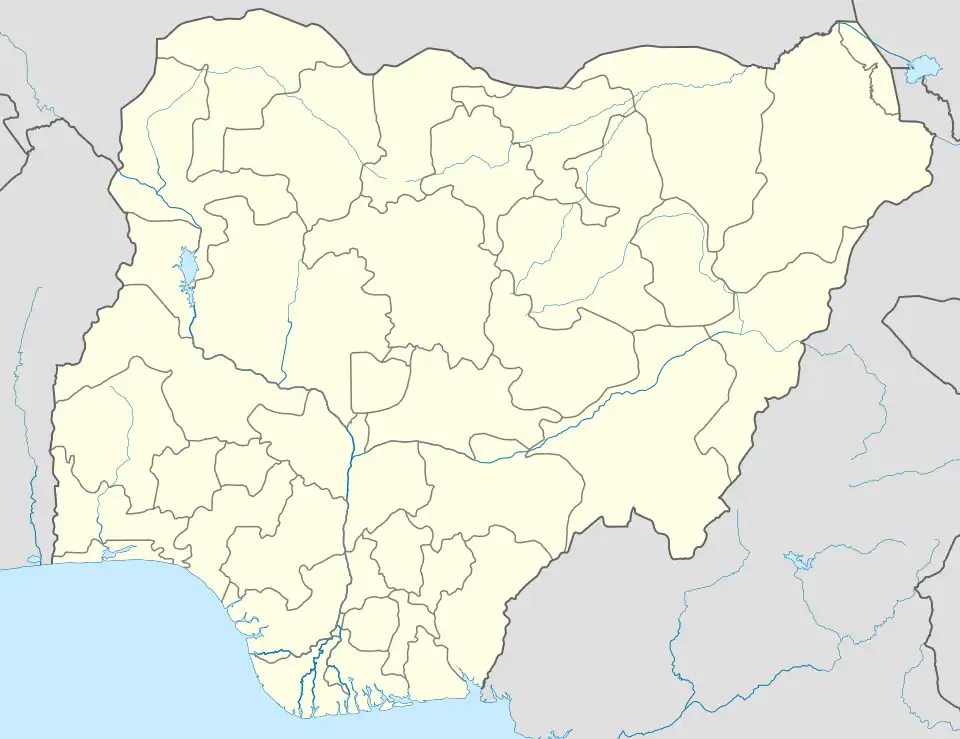Ahaba
Ahaba | |
|---|---|
Village | |
 Ahaba Location of Ahaba Oloko in Nigeria | |
| Coordinates: 5°22′46″N 7°32′44″E / 5.37944°N 7.54556°E | |
| Country | |
| State | Abia State |
| L.G.A | Ikwuano |
| Clan | Oloko |
| Government | |
| • Type | Monarchy |
| • Eze | HRM Eze Chima Onyemachi (Isiala Ahaba) & HRM Eze Dr. Chimezie Nwabueze (Ahaba Ukwu) |
| Elevation | 420 ft (128 m) |
| Population | |
| • Ethnicities | Igbo |
| • Religion | Christianity |
| Time zone | UTC+1 (WAT) |
| 3-digit postal code prefix | 440111 |
| Area code | 440 |
| ISO 3166 code | NG.AB.IK |
| Website | https://ng.geoview.info/ahaba,7073321 |
Ahaba is a rural community in Oloko, Ikwuano Local Government Area of Abia State, Nigeria.[1][2][3] Isiala Ahaba and Ahaba Ukwu are the autonomous communities of Ahaba.[4][5] Ahaba is 23km south of Umuahia, Abia State's capital city.[6]
History
The Aba Women's Riot of 1929 began in Ahaba, when Igbo women suspected the colonial government's intention to use warrant chiefs and the native court system to implement a new tax on women, which they believed the colonial government planned to add to an existing tax on their fellow men.[7]
Culture
The people of Ahaba, like other communities in Ikwuano, celebrate the popular Ekpe festival on January annually to mark the end of a farming season.[8]
Schools
• Ahaba Ukwu Community School
• Migrant Farmer's Primary School, Isiala Ahaba
See also
References
- ↑ Bachi. "Ikpeazu Commends The People Of Ikwuano As He Visit PDP National Organizing Secretary, Akobundu - PUO REPORTS". Retrieved 2023-01-19.
- ↑ Rapheal (2021-11-25). "Old students of OCSS set to immortalise Attah". The Sun Nigeria. Retrieved 2023-01-19.
- ↑ Times, Optimum (2023-01-27). "Diocese Of Ikwuano Anglican Communion Marks 18th Anniversary, As Bishop Onyegbule Ordains Nwokoma, Others". Optimum Times. Retrieved 2023-05-02.
- ↑ Nnah, Mary (2021-01-29). "Nigeria: Pa Ogbonna Herbert for Burial Friday 29". allAfrica.com. Retrieved 2023-01-19.
- ↑ "Pa Ogbonna Herbert for Burial Friday 29 – THISDAYLIVE". www.thisdaylive.com. Retrieved 2023-01-19.
- ↑ "Ahaba populated place, Abia, Nigeria". ng.geoview.info. Retrieved 2023-05-02.
- ↑ Obienusi, Elizabeth Ihuoma (2 May 2023). "Aba Women's Protest and the Aftermath 1929 till 1960" (PDF). Chukwuemeka Odumegwu Ojukwu University. 1 (1): 1–2 – via coou.esu.ng.
- ↑ Atuonwu, Chiedozie (November 2021). "The Historical Study of Ekpe Cultural Festival in Nnono Community". Research Gate. Archived from the original on 15 November 2022. Retrieved 2 May 2023.
{{cite web}}: CS1 maint: bot: original URL status unknown (link)